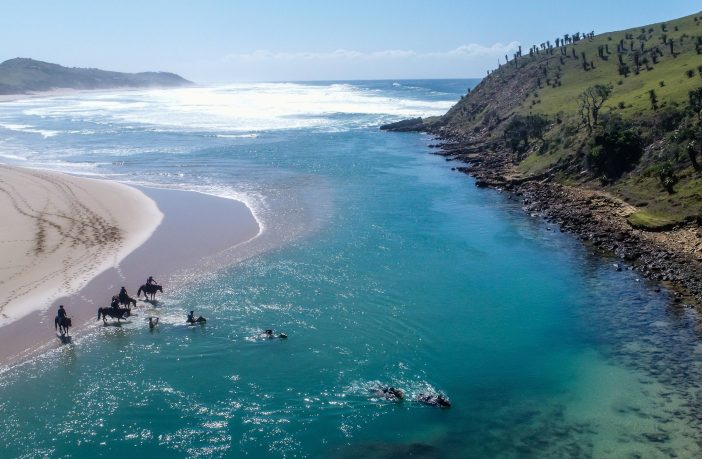- On 17 May 2024, Wild Coast communities and supporting organisations will be in the Supreme Court of Appeal to defend the groundbreaking High Court judgement which set aside Shell’s exploration right to explore for oil and gas off the Wild Coast of South Africa.
In September 2022, Shell, Impact Africa, and the Minister of Mineral Resources and Energy (DMRE) lodged applications for leave to appeal the Makhanda High Court ruling, which was handed down on 1 September 2022 to resounding celebrations.
The court case was brought in December 2021 by Sustaining the Wild Coast NPC, Wild Coast communities, Wild Coast small-scale fishers and All Rise Attorneys for Climate and the Environment NPC, represented by the Legal Resources Centre (LRC) and Richard Spoor Incorporated. Natural Justice and Greenpeace Africa, represented by environmental law firm, Cullinan and Associates, subsequently joined the case.
The case sought to review the decision by the DMRE to grant an exploration right to Shell and Impact Africa, allowing them to conduct exploration activities off the Wild Coast coastline.
In the Makhanda High Court, the communities and supporting organisations argued that the right should not have been granted because:
- There was no consultation with affected communities and the companies’ consultations with traditional leaders was insufficient.
- The decision-makers failed to consider the potential harm to the fishers’ livelihoods, the impact on their cultural and spiritual rights and the contribution of oil and gas exploitation to climate change.
- The decision-makers failed to comply with the requirement of the Integrated Coastal Management Act to consider the interests of the entire community – including fishers and ocean life.
The High Court Judgement
The Makhanda High Court found in favour of the applicants on all of the grounds of review.
The judgement found that there was no meaningful consultation with communities, and that consulting traditional leadership is not sufficient. It further found that because there was no definitive information on the harms to the environment, when deciding whether to grant the exploration right, the DMRE should have used a precautionary approach.
With regard to the harms that could be caused by the seismic testing, the judgement acknowledged the key role of the ocean in the livelihoods, and spiritual and cultural life of coastal communities. The harms to these religious and ancestral beliefs and practices should have been taken into account.
In relation to climate change as well as the issues of the right to food, the judges found that, had the DMRE taken these issues into account, they may have found that the project was “neither needed nor desirable”.
The judgement also found that the decision-makers had unlawfully failed to consider the requirements of the Integrated Coastal Management Act.
The judgement also rejected the arguments of Shell and the DMRE Minister that the case should not proceed because the applicants had not used internal processes to appeal against the granting of the exploration right. The court agreed that by the time the applicants heard it had been granted, the commencement of the seismic survey was imminent, and furthermore that the DMRE Minister had shown himself to be biased in favour of Shell.
Notably, the judge stated that Shell’s Environmental Management Programme (EMPr) contained statements promising jobs and increased government revenue. However, these claims were not supported by evidence in the EMPr. This was particularly important as Shell argued that the applicant communities are poverty-stricken and would benefit economically from oil and gas exploitation.
This judgement set the decision of the DMRE aside.
Appeal Arguments
Shell, Impact Africa and the DMRE Minister are appealing the judgment on various grounds.
They argue that the public had been properly notified of the decision to grant the exploration right and that the court should not have allowed the decision to be challenged so long after it was made.
They also argue that the court was wrong to deal with exploration as a step in a single process that culminates in the production and combustion of oil and gas and was incorrect in applying the precautionary principle to the expert evidence on the harms of seismic surveys.
Shell also argues that the court was wrong to conclude that the public statements made by the DMRE Minister gave rise to a reasonable apprehension of bias. The High Court found that lodging an internal appeal with the DMRE before approaching the High Court would have been an exercise in futility.
The cross appeal
In the Makhanda High Court, a declarator was sought stating that Shell needed an environmental authorisation, as required under the National Environmental Management Act (NEMA), before commencing with the seismic survey. Shell had argued that, because the exploration right was granted prior to the December 2014 enactment of NEMA’s listed activities requiring environmental authorisation for exploration activities, they did not need an environmental authorisation; and their environmental management programme was sufficient, despite the renewal of the exploration right taking place after the enactment of NEMA’s listed activities.
The High Court declined to rule on the declarator as they had set aside the exploration right and, therefore, had concluded that the applicants had obtained a substantial part of their relief. However, the communities and supporting organisations believe that the declarator plays an important role in the advancement and protection of constitutional rights. They have launched a cross-appeal in the Supreme Court of Appeal, asking the court to rule on this, should it differ from the High Court in respect of its finding on the exploration right.
“It’s more important and urgent than ever that we safeguard Mother Earth. We hope the SCA rules to protect her.” – Nonhle Mbuthuma, Amadiba Crisis Committee and recent Goldman Environmental Award Prize winner.
Link tild Coast Warriors Film https://www.wildcoastwarriorsfilm.com/
Source: Natural Justice















